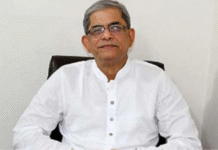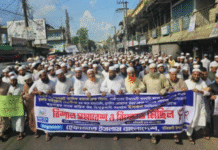M. Shahidul Islam
The Ramadan politics is gyrating toward a volatile ground strewn with too many unknowns and imponderables. Besides, never before street agitations disrupted the peace and tranquility of this holy month as tragically as they did this time.
How and why the political chemistry changed so radically is a conundrum that observers are gasping to penetrate into. On the face of it, though, the floating explanations sticking like lipstick on peoples’ lips are too mundane to take seriously. Yet, we must swallow at least some of them for a number of reasons.
First: Battered by dismal performances in the latest city council elections, the ruling AL finds itself on the loop and is trying desperately to put its house in order before springing into a polling mine field which is only months away.
Secondly: Aware that an emboldened BNP and its allies will not join the poll unless a neutral interim regime of some sorts is appointed first, the AL is hell bent on looking for other parties who may swallow its bait and join the polling to render it some semblance of credibility.
Third: Equally desperate is the Jamat-I-Islami (JI) which finds itself caught between the devil and the deep sea. With most of its senior leaders facing impending death or life long prison terms, the JI has been in a cloak and dagger mission for sometimes to find a survival streak; which it seems to have found, credible sources say, by striking a deal with the ruling AL, which has emitted repeated threats to proscribe JI’s political activities sooner.
Underlying factors
Although many at home and abroad are convinced that these ground realities have led to an unlikely rapprochement between the two diametrically opposing political forces, and, spared the terminally ill Jamat Guru, Golam Azam, from being lynched, the real reasons lie far deeper beneath the surface.
A meeting recently between the JI and the AL representatives through the middleman-ship of a foreign diplomat notwithstanding, there are other confirmed but unpublished reports that selective representatives from the two camps have had a number of parleys at home and abroad since the February 28 death-sentence verdict by the war crimes tribunal against the JI’s Nayebe Emir (vice president), Delawar Hossain Sayedee, and the war-like backlashes spurred by that verdict.
It’s the outcome of such parleys, said a reliable source, that has leaped into the public domain through the judgment rendered in the Golam Azam case on July 14. Azam 90, not actively involved in JI politics, is not someone who can contribute further to the Islamic polity of the nation, and, is widely known to have collaborated with the killer Pakistani regime during the 1971 war of liberation.
Yet, shoving aside all expectations that he would be sentenced to death, the war crimes tribunal displayed an incredulous judicial stunt by rendering a 91 – year prison sentence to a frail, wheel-chair-riding Azam for the five proven charges of crimes against humanity during the liberation war. If lucky, Azam may survive another 9 years at the most, not 91. Many consider the verdict as a joke.
Sources also confirmed that the Kingdom of Saudi Arabia (KSA) and the USA played a major part in stitching together a deal between the AL and the JI, which they say will result in more surprises in coming days with respect to the sentences to be rendered to the main JI leader, Motiur Rahman Nizami, and few others.
Deal without dividend
Politics is known to produce strange bed fellows, but this deal is too much to digest by a nation that had gone through inexplicable hellish experiences since the AL’s coming to power in 2009. Besides, it’s unlikely to yield any dividends to either of the deal makers, and, is destined to beget more troubles in the future.
As for now, the most reverberating query is: Why a deal seemed so indispensible to both the camps after hundreds, or thousands, of deaths for the causes, i.e., preserving Islam or Secularism, which the two camps have shown to believe so fervently?
More importantly, did the AL come to the sense that the Islamist polity is an integral part of Bangladesh’s political landscape and all the attempts to obliterate it, even by indulging in alleged genocides for which the government is being litigated in the International Criminal Court (ICC), has come to knot in the end?
Choice for BNP
While we’re in the dark about the details of the deal, neither of the two camps has, however, any answer in store for their activists and ideologues with respect to what the drama was all about since 2009 when the AL seemed determined to destroy all shreds of Islamic polity on one hand, and, the Islamists showed little hesitation to spill blood in the streets believing their leaders were seriously indulged in preserving the history, heritage and the religion of an Islamic people, on the other.
Now that we know that the secular pretentions of the AL and its allies are as much a hoax as are the Islamic pretentions of the JI, there is a lesson to be learnt and history needs urgent revisiting. The JI has betrayed the people of this nation during the war of liberation while the AL did the same repeatedly since the war’s ending. For betraying peoples’ aspirations, they both deserve to be discarded for good.
The BNP, meanwhile, may do itself a better service by chucking off the JI from its platform, as was suggested before his death in 2005 by the Holiday’s founding editor, Enayetullah Khan, in one of his terminal columns, titled “Jamat: The enemy within.”
Ever since, it was the JI, according to a senior BNP leader, which had convinced the BNP to partake in a dubious poll in 2008, to join the parliament to render legitimacy to a regime that came through an ‘unconstitutional polling mechanism,’ and, to allow a full five year run to an autocratic government that has traumatized its people.
Source: Weekly Holiday









